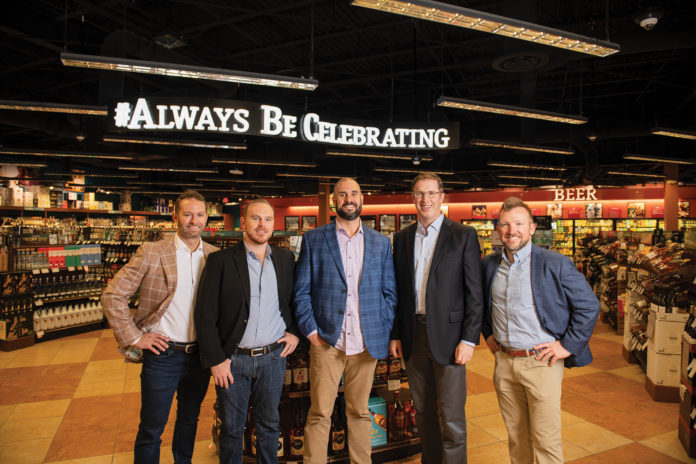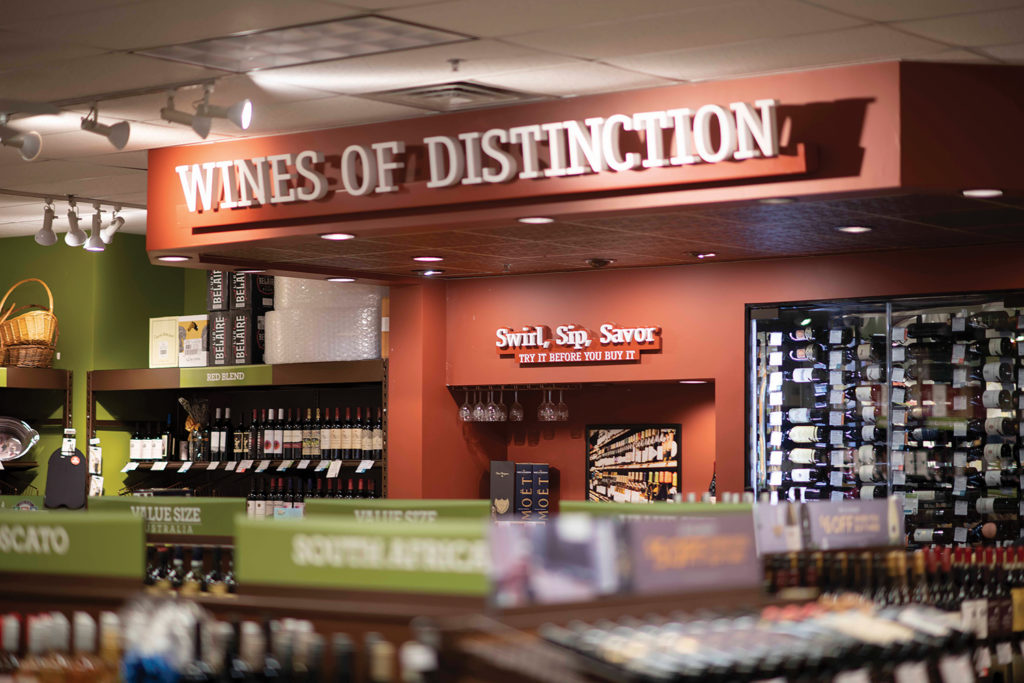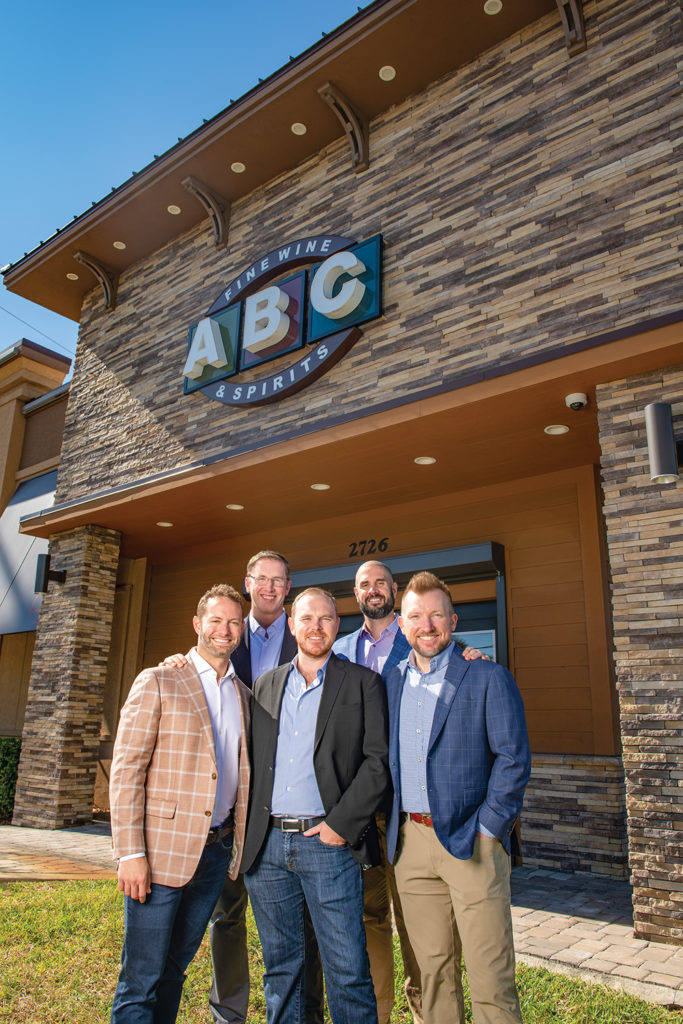
A generational change is underway at ABC Fine Wine & Spirits, and it’s emblematic of how the company has operated since 1936.
Today, the Florida chain counts 125 stores. They are the result of a legacy that began 86 years ago, when entrepreneur Jack Holloway opened Jack Holloway’s Friendly Neighborhood Bar. One part bar, one part package store, this original shop welcomed customers on the corner of North Orange Avenue and Wall Street in downtown Orlando.
Years later, Holloway switched from the eponymous name to ABC Liquors. The reasoning was classic: to appear first in phone books.
Holloway’s early stores were known for revolving bars and lounges. Eventually, these on-premise features phased out in favor of a retail focus. And the business extended its name to ABC Fine Wine & Spirits, in recognition of its growing beverage alcohol selection.
But the family has remained the same. Ownership, management and responsibility have all passed down through the generations. Holloway’s grandsons Charles “Chas” Bailes III (chairman and CEO) and Jess Bailes (executive vice president) have led the company since 1994.
G4 Finds Their Roles at ABC
Charles and Jess are the third generation, or G3, in this family business. Coming up behind them is G4. This generation — representing both the present and future of the company — includes family members and relatives in executive leadership roles, store operations and on the Board of Directors.
G4 includes Charlie Bailes, son of Charles Bailes III. His primary job is head of Team Member Services (HR), while also having role in IT and finance.
Dave Larue is a nephew of Charles and Jess Bailes. He works in sales, merchandising and pricing, and most recently took a leadership role in the company warehouse.
Chad Holloway is a grandson of Jack Holloway, although a generation younger than Charles and Jess. He runs ABC’s beer department, while representing the Holloway side of the company in business matters.
Sean Kelly, married to one of Charles’ daughters, heads up marketing, ecommerce, PR and communications. Kelly works under Charles on the public affairs side of the business, and recently took on responsibility in operations. His brother-in-law, Chris Quarles, oversees ABC’s real estate.
It’s a wide family tree that works well together. Members of G4 have found their way into various executive roles, taking their skills and interests where needed in the company. But this process first involved a lot of growth and hands-on experience.
“Most of us have been in this business for quite a while,” says Larue. “Starting out, we were sales associates and then shift managers. We learned all the operations within the stores, what really makes the stores tick. And we learned to appreciate every job at ABC.”
“A lot of what we’re doing now has shaken out over time, as we naturally gravitated towards what we’re excited about and interested in,” he adds.
This progression was nurtured by G3.
“It’s not as much of a generational transition as much as it is working closely with Chas and Jess,” Larue says. “We’ve split up all the essential duties. But the most important thing is not who’s in charge of what job, but maintaining excellent communication, so that we are aligned, G3 and G4.”
Progress Through Patience
Not every family business passes so efficiently through the generations. Some come undone, usually because of disagreements and distrust among family members. Much the opposite, ABC is buoyed by the levels of confidence and collaboration in its executive team.
“We all have what we’re good at and have learned to trust each other,” says Chad Holloway. “We all fell into our roles organically, and this all transitioned organically. So there’s nobody trying to fit a square peg into a round hole.”
They maintain a broad, practical view of the larger shape of things.
“We all understand that our business and 1,600 employees and family members are bigger than us as individuals,” says Charlie Bailes. “We’ve all come together and put ABC on top of everything. And that’s a path forward put together by the generations before us.”
“The result is patience,” he adds. “Giving us time to find our niches in what we like to do. It’s what’s held the company together for 86 years now.”
Patience is among the core pillars supporting the past and future growth of ABC.
“What Chas and Jess recognized was putting people in position to succeed on their own,” says Kelly. “They’ve empowered us to make decisions.”
This critical level of trust extends into executive meetings.
“We get together with each other on a regular basis and say, ‘Here’s what I’m thinking about’,” Kelly says. “We always hear someone out. We know that each of us is enough of an expert in our fields.”
And when it comes to making big decisions?
“I would say that patience is the biggest thing for us,” Halloway says. “We make sure our ducks are all in a row before we pull the trigger.”

ABC: Adapting for the Future
One example of how this strategy of patience and trust works is with ABC’s successful ecommerce expansion. Sometime before the pandemic, the executive team debated whether to allocate more resources behind growing the company’s digital sales capabilities.
“It took a lot of convincing,” Kelly recalls. “It’s not just the finances involved in an investment like this, but also all that people who have to become involved, the investment in manpower, especially for a smaller company like us.”
Eventually, ABC leadership decided to move forwards with this project. A primary focus was increasing the number of customers who purchased online and then picked up in-store. Before Covid-19 arrived, however, it was slow going. People did not yet understand that they could so easily buy alcohol digitally. But the executive team trusted the process.
Soon, much changed in a hurry. In spring of 2020, the pandemic swept destructively across the globe. Businesses everywhere had to adapt rapidly with a deadly virus that we then knew little about. Safety became paramount. Ecommerce proved vital.
“The investment and technology were already in place,” Kelly says, “so that when we had to switch to curbside pickup only in a matter of just 24, 48 hours, we could do it. At the height of the pandemic, that really helped us keep going at a high rate of speed.”
This lifeline of technology has been eye-opening.
“We’ll continue to invest in those things because the volumes there have stayed big,” Kelly says. “And we’ll give bigger attention to other technology improvements, too.”
This ability to evolve quickly is at the heart of ABC.
“I refer to us as an 85-year-old startup company,” says Bailes, “because we’re able to adapt as quickly as a startup. It’s a testament to the leadership team that we have. It’s amazing what you can do when you throw the resources that we have at a project. We’re looking now to modernize a lot of the back-end systems at our business, the reporting structures.”
“But if you were to bring an all-new ERP into a company like GE, it would take 20 years to implement fully,” he adds. “Whereas we can make that decision quickly. We’re modernizing our back-end into the new norm, because our digital volume has stayed. And we can grow into that new norm quickly because of our ability to be flexible and pivot quickly.”
It’s an important question all businesses currently face: How can you effectively evolve in our new era defined by Covid-19?
“What we’ve learned from projects in these last few years is sometimes you just have to start,” says Kelly. “Larger companies, sometimes they take too much time trying to get it perfect. But you can fall behind if you’re constantly trying to be perfect. We just start, and then we get it perfect. It’s not easy to stomach on some days, but it puts us in a position to succeed.”
This increased ecommerce focus also includes “building relationships with third-party delivery services,” says Holloway. “There’s still so much room to grow in delivery.”
Another successful project that sprung from the attitude of adaptation is the ABC Vault. Allocated whiskeys like Pappy and BTAC, and trendier bottles like Blanton’s or A Midwinter Night’s Dram, have arguably become problematic for retailers. Countless customers clamor for them, the prying phone calls never end, employees are harassed for info, and flippers remain on the hunt. How can you fairly sell these insanely sought-after products?
At ABC, they go into the Vault. The leadership team turned the problem of allocated products into a customer loyalty program. People earn points for every dollar spent at ABC stores through their ABC Access account. Points build up to give people Bronze, Silver or Gold levels of status. ABC Access members who reach Gold key level are eligible for at least one invitation to purchase from the Vault.
“It’s a way to distribute products fairly to guests,” says Kelly. “And it drives loyalty. But for it to work, we needed buy-in from the sales team, the store and the warehouse.”
“It’s also a way to get more people into the store buying more things, because now you have the husband and the wife both increasing their points on their card,” he adds. “And we’re getting more people to give us their email addresses when they sign up. With online privacy laws changing and email open rates declining, you need another way to make people pay attention. Every now and then, you need something to get people excited.”
Members who receive a Vault invitation can purchase one bottle from the available selection while supplies last. As for flippers? Anyone caught reselling items from the Vault is permanently banned from future invitations.
Another new project underway is thehumidor.com. This site offers national ecommerce sales of cigars and other tobacco products.
“It’s slow growth for now,” says Larue. “Long-term, this should be a big success for us.”
As for handling the labor shortage caused by Covid-19, ABC “needs to make sure that our team can afford to work for us, by having competitive wages,” says Kelly. “We also make sure that we offer competitive benefits and incentives.”
“We put a primary focus on people,” he adds. “If we keep getting the people part right, that’s going to keep our business in good shape.”

What’s Next?
ABC and its G4 leaders remain focused on growth in their home state.
“Florida is in really good position,” says Bailes. “We’re currently the 15th-largest economy in the world. Our state leaders have a goal to become the 10th largest by 2030.”
“We have a lot of opportunity to remain a big leader in Florida,” he continues. “We only have three stores in the Panhandle, and only three in Miami-Dade County. And we’re not in the Keys. We are always on the prowl for expansion.”
Six more stores are planned for 2022. At the same time, the company emphasizes helping neighborhoods around their stores, as well as greater Florida. ABC has donated millions of dollars and raised funds for organizations like United Cerebral Palsy of Central Florida, Pediatric Cancer Foundation and Coastal Conservation Association.
This includes helping fund a new charter school opened by the United Cerebral Palsy of Central Florida in fall 2021, with capacity for 500 students.
“We don’t just build stores,” says Holloway, “we build communities.”
As for the future of ABC Fine Wine & Spirits, the members of G4 hopes that it plays out much like their past.
“The road was never perfect,” Larue recalls. “We were always trying to figure out what was the best fit for us. The beauty of this is that it did allow us to learn and live and figure it out for ourselves. And these are the things we’re talking about now for G5.”
“We’re always planning how we can do better business for them and nurture them along in the way that we experienced,” he adds. “That’s our job: passing ABC along even better than the way that we got it ourselves.”
Kyle Swartz is editor of Beverage Dynamics. Reach him at kswartz@epgmediallc.com or on Twitter @kswartzz. Read his recent piece, 11 American Whiskey Trends in 2022.





Nepotism at its finest- you can even read about it openly in the article. I wasted so many years of my life in an attempt to move up with this company, but unless you were a Bailes or a Holloway, that was a losing endeavor. I put in the 70+ hours a week that was expected in my salaried position and only got paid for 40, got stuck at a location in a rough area known for shoplifting while 2 Bailes fresh out of college took over classier and desirable stores. They certainly are a shining example of a company that claims to be small business while running 125 locations with an iron fist.
It’s great to see that Chad and his family have stepped into positions of leadership in this Florida grown company and family! I can totally see him in this role. I knew Chad as he was growing up and he was always so smart and personable. Proud of you!